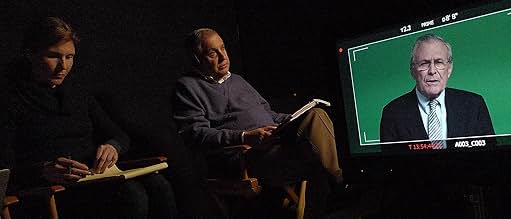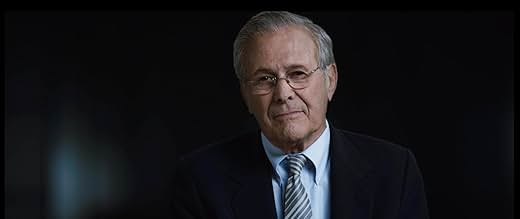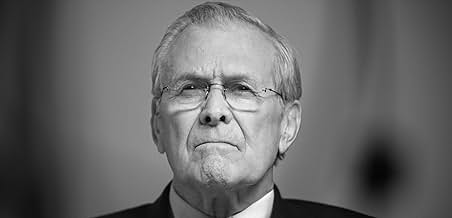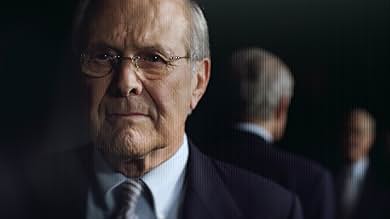The Unknown Known - Die Agenda des Donald Rumsfeld
Originaltitel: The Unknown Known
IMDb-BEWERTUNG
7,0/10
4375
IHRE BEWERTUNG
Füge eine Handlung in deiner Sprache hinzuFormer United States Secretary of Defense, Donald Rumsfeld, discusses his career in Washington D.C. from his days as a congressman in the early 1960s to planning the invasion of Iraq in 2003... Alles lesenFormer United States Secretary of Defense, Donald Rumsfeld, discusses his career in Washington D.C. from his days as a congressman in the early 1960s to planning the invasion of Iraq in 2003.Former United States Secretary of Defense, Donald Rumsfeld, discusses his career in Washington D.C. from his days as a congressman in the early 1960s to planning the invasion of Iraq in 2003.
- Regie
- Drehbuch
- Hauptbesetzung
- Auszeichnungen
- 2 Gewinne & 10 Nominierungen insgesamt
Errol Morris
- Self - Interviewer
- (Synchronisation)
Empfohlene Bewertungen
There's something maddeningly chaotic about Donald Rumsfeld's logic in terms of US international policy. When he was in press conferences during the Iraq War under W Bush, Rumsfeld's answers to tough questions often rang of the so-called "double-speak", a term which is associated with but not explicitly used in George Orwell's "1984". He would respond with other questions or make unfunny jokes. He would use strange metaphors. Rarely did he simply answer direct questions. Errol Morris' documentary about Rumsfeld is strangely similar. He has Rumsfeld do most of the talking, and what comes out of the former Defense Secretary's mouth is a barrage of inconsistencies, untruths, and illogical conclusions. In short, Rumsfeld's whole way of thinking is a jumbled incomprehensible mess. And yet, he was one of the most powerful people in the W Bush administration during the first decade of the 21st century. You could argue W Bush had flawed judgment, Dick Cheney was immoral, but Rumsfeld is in his own realm. As Morris said in an interview, he was one of the most "self-deceiving" people he had ever interviewed.
The format of the documentary is one of the strangest you'll ever see in a film of this type. The subject himself is the narrator. He narrates and then comments on the different subjects covered in the documentary. He occasionally answers questions posed by Errol Morris who can be heard in the background. One of the former Defense Secretary's most interesting phrases is "the absence of evidence is not evidence of absence", a phrase coined by Carl Sagan when referring to the unknown realms of outer space. Rumsfeld is famous for composing 1000's of email memos, and recurring throughout the memos are his definitions of particular words and terms which are displayed on-screen. The film traces his childhood, his early years in politics under President Nixon and briefly under Gerald Ford. He was an adviser for Governor Reagan and later for President Reagan and George Bush Senior. Most of the documentary concerns the Iraq War and his tenure as Defense Secretary under George W Bush.
One example which highlights Rumsfeld own self-deception and denial is when Morris asks about the public perception concerning Saddam Hussein after the 9/11 attacks. Rumsfeld in the documentary claims people knew that Hussein and Iraq had nothing to do with 9/11. The documentary then cuts to a Rumsfeld press conference clip of 2003 in which a reporter quotes Saddam Hussein: "I would like to tell you directly we have no relationship with Al Queada." Rumsfeld's reply: "And Abraham Lincoln was short." The reporter than asks Rumsfeld to respond to Hussein's statement and the Secretary of Defense simply says that Hussein "rarely tells the truth". The implication is clear: Rumsfeld wants the public to believe that Hussein and Iraq contributed to 9/11. If you read between the lines, and realize what is unsaid rather than said, Rumsfeld never actually states that Hussein is lying about having a relationship with Al-Queada. He makes the Lincoln analogy joke and he says that Hussein has a pattern of lying, but never once did Rumsfeld himself directly accuse Hussein of lying about having a relationship Al-Quaeda. This is the kind of double-talk, doublespeak which is how Rumsfeld's reasoning seems to work.
People have criticized the documentary as raising many more questions than it answers. This may be the point of the film. Rumsfeld comes off, at best, as a completely self-deceived person whose rationalities have no logic, and at worst an amoral international leader who got us into an unjust war. His logic, we "lacked imagination" to see the Japanese coming when they attacked Pearl Harbor and thereby justifies the War in Iraq. As Morris points out in an interview, if we can imagine our enemies doing anything in the future, then we can rationalize military operations for almost any reason at any time.
The format of the documentary is one of the strangest you'll ever see in a film of this type. The subject himself is the narrator. He narrates and then comments on the different subjects covered in the documentary. He occasionally answers questions posed by Errol Morris who can be heard in the background. One of the former Defense Secretary's most interesting phrases is "the absence of evidence is not evidence of absence", a phrase coined by Carl Sagan when referring to the unknown realms of outer space. Rumsfeld is famous for composing 1000's of email memos, and recurring throughout the memos are his definitions of particular words and terms which are displayed on-screen. The film traces his childhood, his early years in politics under President Nixon and briefly under Gerald Ford. He was an adviser for Governor Reagan and later for President Reagan and George Bush Senior. Most of the documentary concerns the Iraq War and his tenure as Defense Secretary under George W Bush.
One example which highlights Rumsfeld own self-deception and denial is when Morris asks about the public perception concerning Saddam Hussein after the 9/11 attacks. Rumsfeld in the documentary claims people knew that Hussein and Iraq had nothing to do with 9/11. The documentary then cuts to a Rumsfeld press conference clip of 2003 in which a reporter quotes Saddam Hussein: "I would like to tell you directly we have no relationship with Al Queada." Rumsfeld's reply: "And Abraham Lincoln was short." The reporter than asks Rumsfeld to respond to Hussein's statement and the Secretary of Defense simply says that Hussein "rarely tells the truth". The implication is clear: Rumsfeld wants the public to believe that Hussein and Iraq contributed to 9/11. If you read between the lines, and realize what is unsaid rather than said, Rumsfeld never actually states that Hussein is lying about having a relationship with Al-Queada. He makes the Lincoln analogy joke and he says that Hussein has a pattern of lying, but never once did Rumsfeld himself directly accuse Hussein of lying about having a relationship Al-Quaeda. This is the kind of double-talk, doublespeak which is how Rumsfeld's reasoning seems to work.
People have criticized the documentary as raising many more questions than it answers. This may be the point of the film. Rumsfeld comes off, at best, as a completely self-deceived person whose rationalities have no logic, and at worst an amoral international leader who got us into an unjust war. His logic, we "lacked imagination" to see the Japanese coming when they attacked Pearl Harbor and thereby justifies the War in Iraq. As Morris points out in an interview, if we can imagine our enemies doing anything in the future, then we can rationalize military operations for almost any reason at any time.
I have rarely been so perplexed by a documentary film as by this one. It is 102 minutes long, and for much of that time Donald Rumsfeld is talking to the director/interviewer Errol Morris. However, despite that, I now feel that I know less about Donald Rumsfeld than I did before I saw the film. I almost preferred him as an unknown unknown to what he now is, an unknown known. Rumsfeld manages to talk endlessly in what appears to be a very candid way, without ever really saying anything. A few salient facts do emerge, but only a few. The most surprising one to me was the revelation that he and George Bush Senior evidently detest one another, although Rumsfeld thinks very highly indeed of 'W'. I also did not realize until I saw this film that Rumsfeld and Dick Cheney are so close, and worked together for so many years, that they are like brothers. However, a slight trace of vanity appeared throughout the film as Rumsfeld was always very careful to describe Cheney on several occasions as 'my deputy'. Just in case little brother got any big ideas about forgetting who was the older brother, I suppose. Cheney was indeed Rumsfeld's deputy for a long time in office. When Cheney became Vice President, it was Cheney who recommended to George W. that Rumsfeld be made Secretary of Defence. So yes, some facts did emerge, and they are interesting. As for Rumsfeld himself, he remains an enigma in the highest degree. I was surprised to discover how astonishingly intelligent Rumsfeld was. One does not normally expect to find that in a public figure. But the most interesting aspect of Rumsfeld's personality is that a sense of ironical whimsicality seems to pervade everything he says, thinks, and does. Those grins that he makes are not normal grins, they are grins at the ironical whimsicality of situations and events. They are an invitation to those watching him to share his sense of irony and delight. Rumsfeld's grins do not say, as most grins do: 'Hello, I'm very friendly,' they say instead: 'Isn't that wonderfully whimsical, and don't you want to grin with me about it?' In other words, Rumsfeld is not like other men. I had no idea that Rumsfeld had commenced working in the executive branch of the Government during the Kennedy Administration, having previously been a congressman. This film says nothing whatever of his business activities, and does not mention his launching of the agricultural chemical spray Roundup upon the world, which in some opinions was an act more serious than the Iraq War, and may cause more deaths (deaths which cannot be defended on any 'just cause' basis, as the cause was only making money). No one could appear to cooperate more in making a film about himself than Donald Rumsfeld did, but the feeling afterwards is that he is a master at appearing to be transparent while all the while surrounding himself in a cloud of ink like an octopus. People often joke about eating Chinese food (in a bad Chinese restaurant), when they consume a lot but feel hungry immediately afterwards. Well! Where is the real meat on Rumsfeld, or is he all grissle? Nor is there any fat to chew on, only snowflakes. This man is a mystery, truly he is.
Famously rigorous filmmaker Errol Morris sits a subject in front of him and the subject won't budge. This is, unfortunately, the takeaway from this documentary - a tremendous disappointment of a film in some way, but an extraordinary documentation of psychosis in another.
Rumsfeld apparently so annoyed Morris with his crafty replies that the director felt it necessary to follow up his film with a wild press tour apologizing for it - including a four part investigation into Rumsfeld's evasiveness in a New York times op-ed. In another article he called this film 'a horror movie'.
And it's understandable. Those who were against the wars in Iraq and Afghanistan will be infuriated- it gives us no new answers as to the motives behind the wars, no candid insights into Rumsfeld's tenure, and instead presents us with the same smirking blur of a man that we all got to know from his press conferences. Without a glint of uncertainty in his eye, he repeats essentially the same shtick as he always has. Direct questions are deflected with a grin and a wave.
Indeed, nobody deserves to be investigated more than Rumsfeld or his former compatriots, and Morris would ordinarily be the man to do it. But for an encounter to take place between two people, both need to be there. In this case one was absent. Those expecting a one on one - a whittling away towards the real substance - will leave empty handed because Rumsfeld is a ghost. There ain't nothing there. We've all been punk'd.
Rumsfeld apparently so annoyed Morris with his crafty replies that the director felt it necessary to follow up his film with a wild press tour apologizing for it - including a four part investigation into Rumsfeld's evasiveness in a New York times op-ed. In another article he called this film 'a horror movie'.
And it's understandable. Those who were against the wars in Iraq and Afghanistan will be infuriated- it gives us no new answers as to the motives behind the wars, no candid insights into Rumsfeld's tenure, and instead presents us with the same smirking blur of a man that we all got to know from his press conferences. Without a glint of uncertainty in his eye, he repeats essentially the same shtick as he always has. Direct questions are deflected with a grin and a wave.
Indeed, nobody deserves to be investigated more than Rumsfeld or his former compatriots, and Morris would ordinarily be the man to do it. But for an encounter to take place between two people, both need to be there. In this case one was absent. Those expecting a one on one - a whittling away towards the real substance - will leave empty handed because Rumsfeld is a ghost. There ain't nothing there. We've all been punk'd.
Errol Morris tackles another former United States Secretary of Defense in Donald Rumsfeld with an in-depth interview. It starts mainly on the invasion of Iraq but covers his entire Washington career and his personal life. The Iraq stuff is not anything new especially if one had paid attention. Rumsfeld is as evasive as ever. His earlier work for previous Presidents holds some interest inside stories. The obvious comparison is Errol Morris' masterpiece "The Fog of War". In that one, Robert McNamara is much less a politician and more of a wise elder lamenting mistakes. That is a much more compelling watch. This one is an extended Sunday morning political talk show and a simple biodoc of Rumsfeld's career. Errol Morris' views are obvious from his questioning. The history is informative but nothing shocking. Maybe in another twenty years, Rumsfeld will have something more interesting and surprising to say.
STAR RATING: ***** Saturday Night **** Friday Night *** Friday Morning ** Sunday Night * Monday Morning
Former US Secretary of Defence Donald Rumsfeld finds himself being grilled one on one by documentary maker Errol Morris in this follow up to his 2003 expose The Fog of War. A controversial figure as a result of being one of the key architects of the wars in Afghanistan and Iraq, Rumsfeld is called to defend his actions, and is put in the spotlight about some glaring inconsistencies in the thousands of memos, 'snowflakes', as he called them, that he was fond of writing that questioned the validity of the invasions. At the same time, Morris presents some of the background of his subject, from being the youngest and then the oldest holder of his post, as well as serving under no less than four US presidents.
Being remembered, as it will, as the first big war of the 21st century, the invasion of Iraq is still seen by many as a massive travesty, and a gross abuse of power, that many still want answers to. In some small way, Errol Morris here attempts a stab at this, by gaining access to one of the key figures at the heart of the matter. Throwing the spotlight completely on Rumsfeld, the man and his foibles are exposed for all to see, and with no escape. The title of the film is a part of one of the man's most confusing and tongue twisting uses of language, that probably makes a lot of sense to him, but just confuses (and infuriates) most others. He continues with this type of garble throughout, and often rounds it off with that questionable grin of his that will make him even harder to stomach for those already unconvinced by his rhetoric.
The film covers a lot of interesting ground, and has much back story to ponder over, but there's little to be distracted from than a man sitting down and talking to a camera, which is inevitably boring at times and causes your attention to wonder. It might also be a case of too much information to take in, at a running time stretching to just over an hour and a half. All the same, I can say I preferred it to The Fog of War, with Morris somehow managing to make it all just a little more digestible and affecting.
Rumsfeld doesn't come off as an entirely desirable guy, a man who clearly uses language designed to sound clever but obviously just with the purpose of confusing, whose nonsense is signed off with a patronising smile, and who leaves a lot of unanswered questions on the lips of those affected by the not completely kosher decisions he was part of making. For those who already weren't fond of him, it won't make them feel any better, whilst others will just see the man behind the suit, and have to make their own mind up. Morris has brought him out in a manner that has a lot of interesting material, but not the most thrilling execution. ***
Former US Secretary of Defence Donald Rumsfeld finds himself being grilled one on one by documentary maker Errol Morris in this follow up to his 2003 expose The Fog of War. A controversial figure as a result of being one of the key architects of the wars in Afghanistan and Iraq, Rumsfeld is called to defend his actions, and is put in the spotlight about some glaring inconsistencies in the thousands of memos, 'snowflakes', as he called them, that he was fond of writing that questioned the validity of the invasions. At the same time, Morris presents some of the background of his subject, from being the youngest and then the oldest holder of his post, as well as serving under no less than four US presidents.
Being remembered, as it will, as the first big war of the 21st century, the invasion of Iraq is still seen by many as a massive travesty, and a gross abuse of power, that many still want answers to. In some small way, Errol Morris here attempts a stab at this, by gaining access to one of the key figures at the heart of the matter. Throwing the spotlight completely on Rumsfeld, the man and his foibles are exposed for all to see, and with no escape. The title of the film is a part of one of the man's most confusing and tongue twisting uses of language, that probably makes a lot of sense to him, but just confuses (and infuriates) most others. He continues with this type of garble throughout, and often rounds it off with that questionable grin of his that will make him even harder to stomach for those already unconvinced by his rhetoric.
The film covers a lot of interesting ground, and has much back story to ponder over, but there's little to be distracted from than a man sitting down and talking to a camera, which is inevitably boring at times and causes your attention to wonder. It might also be a case of too much information to take in, at a running time stretching to just over an hour and a half. All the same, I can say I preferred it to The Fog of War, with Morris somehow managing to make it all just a little more digestible and affecting.
Rumsfeld doesn't come off as an entirely desirable guy, a man who clearly uses language designed to sound clever but obviously just with the purpose of confusing, whose nonsense is signed off with a patronising smile, and who leaves a lot of unanswered questions on the lips of those affected by the not completely kosher decisions he was part of making. For those who already weren't fond of him, it won't make them feel any better, whilst others will just see the man behind the suit, and have to make their own mind up. Morris has brought him out in a manner that has a lot of interesting material, but not the most thrilling execution. ***
Wusstest du schon
- WissenswertesThis same director also made Fog of War, a similar film that featured an extensive interview with Vietnam-era Secretary of Defense, Robert McNamara. Both films were highly critical of their lead subjects management of war.
- Crazy CreditsIvan & Boris
- VerbindungenFeatured in At the Movies: Venice Film Festival 2013 (2013)
- SoundtracksWhite Christmas
Written by Irving Berlin
Performed by Tennessee Ernie Ford
Courtesy of Capitol Records Nashville under license from Universal Music Enterprises
Top-Auswahl
Melde dich zum Bewerten an und greife auf die Watchlist für personalisierte Empfehlungen zu.
- How long is The Unknown Known?Powered by Alexa
Details
Box Office
- Bruttoertrag in den USA und Kanada
- 276.497 $
- Eröffnungswochenende in den USA und in Kanada
- 64.315 $
- 6. Apr. 2014
- Weltweiter Bruttoertrag
- 301.604 $
- Laufzeit
- 1 Std. 43 Min.(103 min)
- Farbe
- Sound-Mix
- Seitenverhältnis
- 2.35 : 1
Zu dieser Seite beitragen
Bearbeitung vorschlagen oder fehlenden Inhalt hinzufügen
























